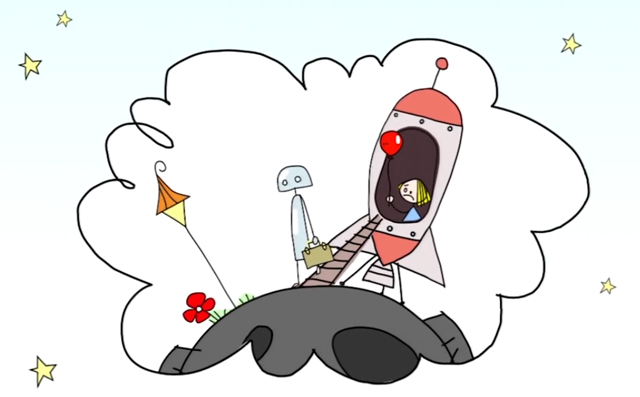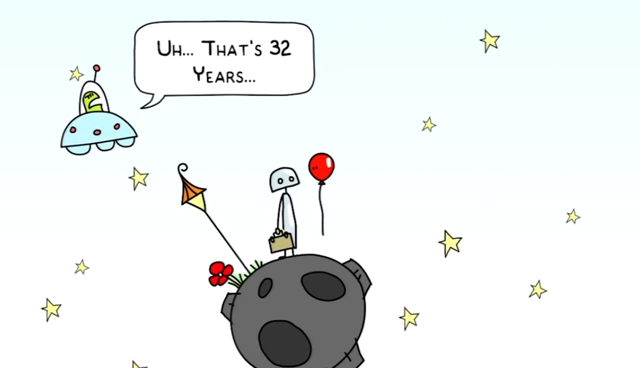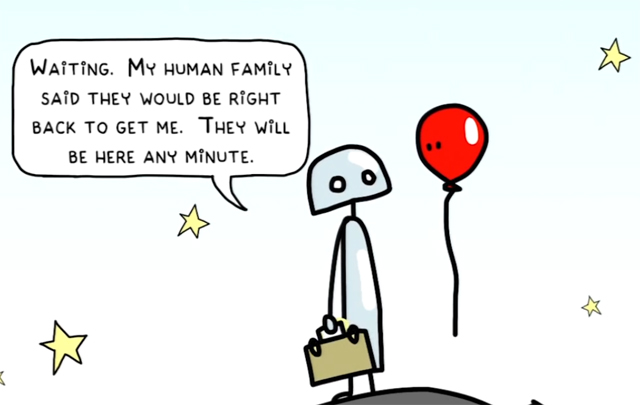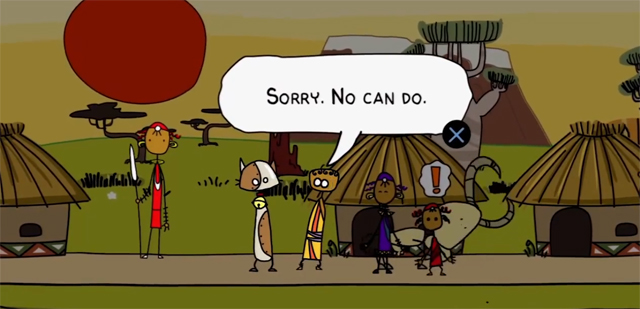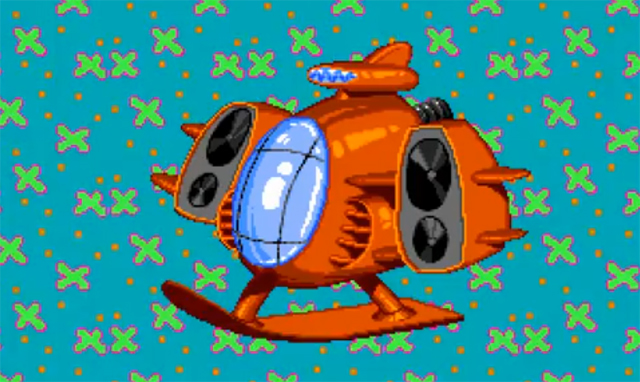Talking ToeJam & Earl with Greg Johnson – Part 2: How Race Affected Doki Doki Universe
This is the second part of a three-part conversation with ToeJam & Earl creator Greg Johnson. You can read the first part here.
Josh: I’d like to transition real quick to Doki Doki Universe, because I finally did get a chance to play it. I was really blown away by a lot of the things you did with it conceptually, exploring what makes us human and what that might look like to an alien. Because you’ve got this very human character who’s a robot, and he experiences some pretty traumatic stuff (that’s kind of glossed over a little bit for kids), but it has the issue of being abandoned somewhere for 20 years [correction: it was actually 32 years] and just kind of patiently waiting for someone to come pick you up…
That really affected me deeply on a lot of levels. I thought that was really well done and really brilliant. I liked the way you could be subtle about some of the deeper human stuff, but still work it into a game that felt that kid-friendly.
Greg: Oh, well thanks. Actually, that’s nice that you bring that up. I’ve been doing a lot of interviews lately with this Kickstarter thing, and I haven’t talked much about that.
When you step back just a little bit, you can see… some real connections between Doki Doki Universe and ToeJam & Earl, and the whole idea of looking at humanity and at ourselves from an outside perspective. In this case, it’s a robot looking at humans, and with ToeJam & Earl it’s aliens. But I think it’s probably not coincidental that they have such a similar theme.
And also, in regards to that intro that you’re referring to, thanks for mentioning that it was meaningful for you and touching. It’s funny, but I still get kind of choked up when I watch that little intro too. There’s something about that whole abandonment notion that I think is just so powerful emotionally…
That little robot was standing there saying, “Well, they said they’d be back. They’ll be back any minute.” And he never, after all those years, never gives up hope. [He has] 100% faith that you would be back for him because you said you would. And there’s something heartbreaking about that. And then you look at it from the other perspective, in this case the little girl who wanted to return… It could be anything, a family member who’s left their dog and can’t get back again, and [you have] just a heart-wrenching situation that I wanted to open the game with.
I showed it to the people at Sony — Connie Booth, who runs Sony Bay area game studio and is just the sweetest person. They have a huge love of story there, and they really wanted a powerful story. I said, “I’m going to give you a really emotional story.” Connie was like, “Oh my gosh, this is heartbreaking! We can’t show this!” And then she said, “But I love it. But it’s so heartbreaking!”
I’m not really sure what the linkback to that specific scene is in ToeJam & Earl, but I do have a real love of emotionally compelling situations and characters. It’s rare in the video game world. It does exist. It’s out there. And every now and then, when I run across it, I get overjoyed when somebody has managed to actually touch something deeper inside of me. And I always applaud the effort whenever I see people trying to do that, you know?
I don’t know that ToeJam & Earl really does that, per se. It’s kind of at a lighter level. There is sort of a satire there that some people — a lot of people recently — have been commenting on. The kinds of emotions that it taps into is just, sort of, lighter, joyful, humor, and it’s kind of intended to be more of a stress releaser than anything else.
Josh: I guess I saw it more clearly in Panic on Funkotron, with how goofy these humans are. It almost felt like [you were pointing] out a few of the things that are just really goofy about humanity, and [trying] to look at it through an alien perspective. And I thought that was really fun. It was fun and witty and just really cool.
Greg: I think it was easier to see in Panic on Funkotron, because of the size of the characters and the clarity of the game. We had more audio in that too.
We kind of took that idea a little bit farther, with the tourists looking at you going “How cuuuuuuuute!” And whatever it was, the man in the box…
Josh: The naked man in the box? I loved that!
Greg: Singing opera, I don’t know why. A lot of this stuff, you just can’t question too much because there is no real reason behind it. The little girl, she ran up and kicked you in the shins — it’s just this annoying, bratty kid. There was just an endless number of characters that kind of just were all sort of trying to satire one aspect or another of who we are.
Josh: So, with Doki Doki Universe, once I finished the game, I went and read Polygon’s review of it, and they felt like there were some racist undertones to — was it Planet Africa?
Greg: Yeah, Afri.
Josh: Right. From my understanding, you come from a mixed race ethnicity. Did you feel like that was maybe a little unfair of them, or do you think maybe there was some merit to it?
Greg: Well, we shouldn’t say them. It was just that one reviewer. I don’t know that he really represented the views of other people there. Overall, he gave us a really positive review, and I was happy with the review in general, and appreciative of him. He gave us a good rating and everything, which was really really great. I think he gave us an 8 out of 10.
But that one particular part? No question, it did kind of hit me a little bit, and it was a little disappointing to see that.
I don’t blame him. It was well-intentioned, his leaping to the defense of African American people. Later on, he had even [written] in some other posting that he has a tendency to maybe be a little over-reactive or overprotective of issues like that. So he definitely had a level of self-awareness that I respect.
But that’s pretty common. It’s happened to me a number of times in my career. It was particularly an issue with ToeJam & Earl 3. It was an issue in Doki Doki Universe. It was an issue with Orly’s Draw a Story, a game I did years ago, with a little black girl, a Jamaican character who spoke Jamaican patois. I think I mentioned this in some interview — I don’t remember which one — but I got kind of hammered for that at the time too.
But yeah, I’m half and half. My dad’s black and my mom’s white. She’s very white, you know, very light-skinned, kind of reddish blond hair from a Russian Jewish ancestry. And my dad was not a very dark-skinned African American guy, and so I came out light, and I have kind of blue eyes, so it’s recessive genes. My brothers and my sister came out much darker than me.
Anyway, that’s just a part of my heritage, and it kind of comes out in the things I create, I guess. That’s part of why I love that part of our American culture, especially the music side of that.
Like I said, people have good intentions, but I think a little too often they’re ready to leap up on that high horse and use it as a podium, partly maybe because it’s a way to get attention as a reviewer. I don’t want to be too cynical about that. I prefer to think of people as having good intentions. But even then, with the best of intentions, it has the side effect of making it really difficult for developers to create characters with broader ethnicities. It’s just a little risky, because then you come under fire, and nobody wants that. So people tend to play it safe.
Josh: It does tend to be a hot-button topic, and in instances where it not always needs to. But having played through the entire game and having read that particular review, I think from your side it came from a place of good intentions, and from the revier’s side it came from a place of good intentions. But I can see not totally seeing eye-to-eye on that maybe.
Greg: I’m always a big believer in giving people the benefit of the doubt and cutting people slack and assuming they mean the best, and it’s really nice when you see reviewers do that as well. I never mind people expressing criticisms or concerns, but I always am really appreciative of it when I see people doing that hand-in-hand with — or followed quickly by — assuming the best about what people intended.
That’s not always the case. I think it’s fun for reviewers sometimes to get very hypercritical, and even to slam the developers or take sort of the ethical high ground when it’s just not necessary. You could assume that people had good intentions, you know, and be a little more gracious.
And in this case [Polygon’s Doki Doki Universe review] he was pretty gracious. I wasn’t really too upset by that. But I have seen instances where it’s not like that and that’s often disappointing. Especially when I happen to be at the receiving end of it.
Every time I start to make a new game, I kind of ask myself, “Am I ready for that? Do I want to do that or should I play it safer on this one?” Every time you start creating a new game character, there’s that question in your mind: “Will I be able to do justice to them if I make them some other ethnicity or even gender?” You want to do it right, because you don’t want to kind of come under fire. Because that’s just kind of exhausting.
In the final part of this interview, Greg and I discuss drug use a bit, and about how ToeJam & Earl could maybe be a strange metaphor for adolescence.

